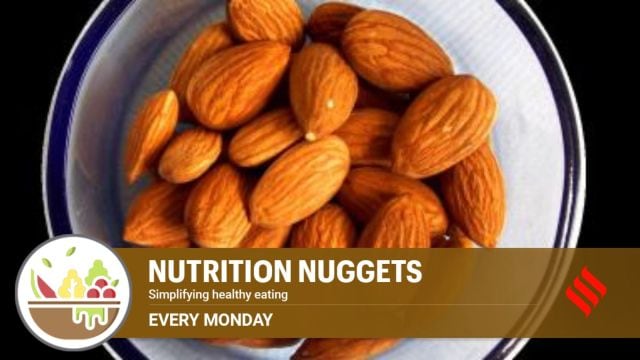Should almonds and raisins be soaked in colder months?
A guide on how those with cholesterol and blood sugar should have this mix
 Soaking almonds overnight improves their digestibility and nutrient absorption.
Soaking almonds overnight improves their digestibility and nutrient absorption.As winter approaches, we should be looking at foods that boost immunity against the cold. I would recommend almonds and raisins to begin your day with or had as an in-between snack. Usually, I am asked if they should be had soaked or dry in winter? And how much should those with cholesterol or blood sugar concerns consume?
WHY ALMONDS AND RAISINS?
Almonds are rich in monounsaturated fats, which are heart-healthy fats that can help reduce bad cholesterol levels. They contain plant-based proteins, making them an excellent snack for vegetarians or anyone seeking to increase their protein intake. They are packed with essential vitamins and minerals like vitamin E, magnesium, calcium and potassium. Vitamin E acts as an antioxidant, protecting cells from oxidative damage, while magnesium and potassium help regulate blood pressure. A good source of dietary fibre, almonds help improve digestion and keep you feeling full, which can slow down blood glucose release and help with weight management.
Raisins are dried grapes that have a natural sweetness, are a powerhouse of antioxidants, fibre and minerals. They contain natural sugars, a quick source of energy, making them ideal for a mid-day snack or as part of a workout recovery meal. They are rich in polyphenolic compounds, particularly flavonoids, which can help reduce inflammation and oxidative stress in the body. Rich in iron and potassium and high in fibre too.
SHOULD YOU SOAK ALMONDS AND RAISINS IN WINTER?
Soaking almonds overnight improves their digestibility and nutrient absorption. In winter, your digestion does get affected because your body’s metabolism slows down to conserve heat. Besides, soaking removes enzyme inhibitors, allowing your body to better access the almond’s vitamins and minerals. Additionally, soaked almonds are less likely to cause digestive discomfort, such as bloating, since soaking softens the almond’s tough skin. It is easier to chew as in winter our bodies crave something softer and more hydrating.
Raisins are already soft, but soaking them can enhance their sweetness, digestibility and their antioxidant activity, needed for your immune system, especially during the colder months.
HOW MUCH TO HAVE?
Studies have found that consuming a handful of almonds (about 20-25 almonds) daily can help reduce bad cholesterol without leading to weight gain. Those already with high cholesterol should take five to 10 almonds per day as good fat is also calorie-dense.
Raisins, while naturally sweet, have a low glycemic index, meaning they do not cause sharp spikes in blood sugar levels when eaten in moderation. A handful of raisins (around 20–25 grams) can be part of a balanced diet for people managing blood sugar. Combine raisins with protein-rich foods like almonds to avoid an excessive sugar load. A recommended serving could be 5-10 almonds and a small handful (about 10-15) raisins.
(Narang is nutritionist, Indraprastha Apollo Hospital, Delhi)
Photos



- 01
- 02
- 03
- 04
- 05




























